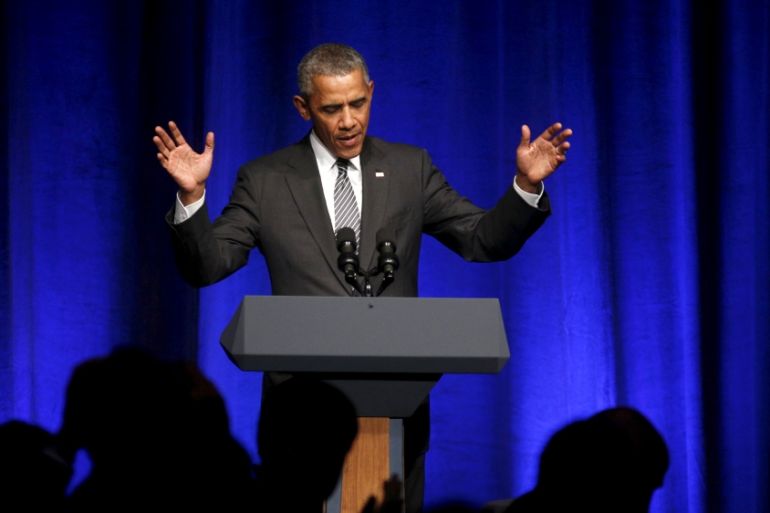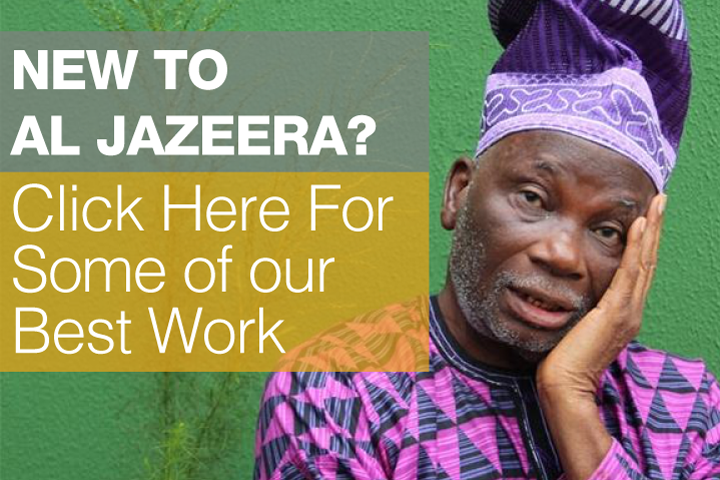Obama: Bad governments cannot meet UN goals
US president calls for anti-poverty drive during annual meet of world leaders increasingly focusing on Syria’s conflict.

New York, United States – US President Barack Obama has warned world leaders that they will not meet new UN anti-poverty targets without tackling corruption and ending discrimination against women, gays and other marginalised groups.
Obama spoke at the launch of the UN’s new sustainable development goals (SDGs) on Sunday in a diplomatic meet that has been overshadowed by conflicting Western and Russian approaches to Syria’s civil war.
Keep reading
list of 4 items‘We share with rats’: Neglect, empty promises for S African hostel-dwellers
Thirty years waiting for a house: South Africa’s ‘backyard’ dwellers
Photos: Malnutrition threatens future Afghan generations
“Development is threatened by bad governance,” Obama said in a 28-minute speech in which he criticised unequal societies and discrimination against women, gays, disabled people, ethnic minorities and other groups.
“In the face of corruption that siphons billions away from schools and hospitals and infrastructure into foreign bank accounts, governments have to embrace transparency and open government and rule of law,” he said.
He spoke on the final day of a three-day meeting on the SDGs – a blueprint of 17 targets to end poverty globally and tackle other problems that each of the UN’s 193 members has agreed to work towards, voluntarily, until 2030.

Advocates say the goals are a noble effort to improve the planet. Critics say they are too ambitious and, with an estimated annual price tag as high as $5 trillion, too costly for a global economy that is still recovering from the 2007-08 credit crunch.
RELATED: Eradicating world poverty in 15 years
Some financial concerns were allayed on Saturday, when Chinese President Xi Jinping announced that Beijing will establish an assistance fund with an initial pledge of $2bn to help developing countries implement the agenda.
China will have committed $12bn by 2030, he said, while unveiling plans to exempt some poor, landlocked and island nations from debt. “China will continue to take a right approach to justice and interests by putting justice before interests,” he said.
Talks on Syria
On Monday, Obama is scheduled to co-chair a meeting to bolster UN global peacekeeping operations around the world and to meet with his Russian counterpart, Vladimir Putin, for talks on the crises in Ukraine and Syria.
On Sunday, US Secretary of State John Kerry spoke positively about the talks between Obama and Putin.
|
|
But behind closed doors, White House and Kremlin officials have disagreed on what the two leaders will discuss and even who initiated the meeting.
“This is the beginning of a genuine effort to see if there is a way to de-conflict, but also to find a way forward that will be effective in keeping a united, secular Syria that can be at peace and stable again without foreign troops present,” Kerry told reporters.
Obama and Putin have disagreed over the crisis in Ukraine and the future of Syria, which is mired in a four-year civil war. Obama says Syrian President Bashar al-Assad cannot remain in power, while Putin continues backing his most strategic Middle Eastern ally.
Russia has stepped up military deployments to Syria in recent weeks, reportedly with combat aircraft, tanks and other gear that will bolster Assad’s beleaguered forces in their fight against multiple armed groups, including the Islamic State of Iraq and the Levant (ISIL).
RELATED: Syria’s brutal civil war to top US-Russia agenda
The Kremlin and the White House share concerns about ISIL, but disagree on their approaches to the group that control swaths of Sunni-majority zones on either side of the Syria-Iraq frontier.
Putin says Damascus should be included in efforts to fight ISIL. The US rejects Assad and says ISIL can be defeated with US-led air strikes and ground forces from the region, including about 5,400 moderate Syrian rebels who are being trained by the US.
That scheme is floundering; some rebels have surrendered ammunition and six pick-up trucks to the al-Qaeda-affliated Nusra Front. In an interview with US television networks that was released ahead of the meeting, Putin said US support to rebels breaks international rules.
“It turns out that only 60 of these fighters have been properly trained, and as few as four or five people actually carry weapons,” Putin said. “The rest of them have deserted with the American weapons to join ISIS,” he added, referring to ISIL.
Assad’s future
Meanwhile, some US allies are shifting position on Assad’s future. German Chancellor Angela Merkel says Assad should be involved in any peace talks that could help stop refugees flowing from Syria to Europe; Britain says he could remain in power during a six-month post-war transition.
American policy on Syria is at a crossroads, not because there is any appetite for a different policy in the White House but because all the existing approaches have collapsed.
Against a backdrop of softening of Western attitudes on Assad, Jonathan Cristol, a scholar at the World Policy Institute think-tank, said he doubted the upcoming talks between Obama and Putin would break the deadlock on Syria.
“US-Russia relations are at their lowest point since the end of the Cold War. It’s important that they coordinate, but they will likely only be coordinating their disagreements and I doubt that Obama meeting Putin can realistically change that,” Cristol told Al Jazeera.
“Obama won’t persuade Putin to withdraw Russia’s forces from Syria, nor will Putin change Washington’s stance on Syria. Only circumstances will change the US position, and frankly, that is happening.”
Hussein Ibish, an analyst at the Washington-based Arab Gulf States Institute think-tank, said Putin has the upper hand in talks.
“American policy on Syria is at a crossroads, not because there is any appetite for a different policy in the White House but because all the existing approaches have collapsed,” Ibish told Al Jazeera.
“Having an incoherent policy, or perhaps no policy at all, effectively leaves the US at the mercy of countries like Russia, which has a clear policy designed to effectuate an outcome in Syria – maintaining a dictatorship in as much of the country is possible.”
The UN has hosted one of the best-attended gatherings in diplomatic history over recent days, with about 150 heads of state attending, including Obama, Xi, French President Francois Hollande, German Chancellor Angela Merkel, Iranian President Hassan Rouhani and Pope Francis.
Follow James Reinl on Twitter: @jamesreinl